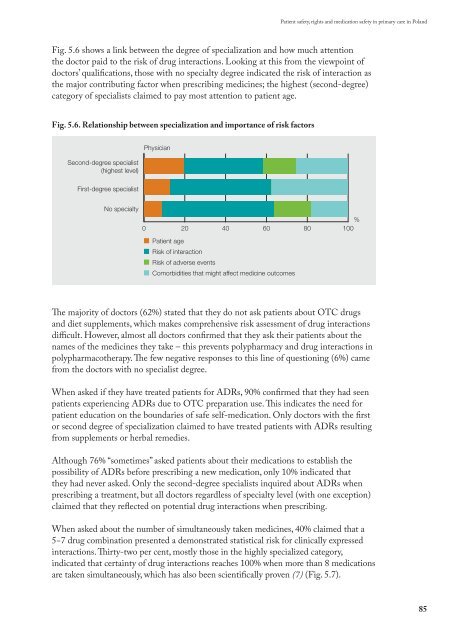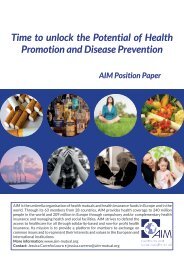Exploring patient participation in reducing health-care-related safety risks
Exploring patient participation in reducing health-care-related safety risks
Exploring patient participation in reducing health-care-related safety risks
You also want an ePaper? Increase the reach of your titles
YUMPU automatically turns print PDFs into web optimized ePapers that Google loves.
Patient <strong>safety</strong>, rights and medication <strong>safety</strong> <strong>in</strong> primary <strong>care</strong> <strong>in</strong> Poland<br />
Fig. 5.6 shows a l<strong>in</strong>k between the degree of specialization and how much attention<br />
the doctor paid to the risk of drug <strong>in</strong>teractions. Look<strong>in</strong>g at this from the viewpo<strong>in</strong>t of<br />
doctors’ qualifications, those with no specialty degree <strong>in</strong>dicated the risk of <strong>in</strong>teraction as<br />
the major contribut<strong>in</strong>g factor when prescrib<strong>in</strong>g medic<strong>in</strong>es; the highest (second-degree)<br />
category of specialists claimed to pay most attention to <strong>patient</strong> age.<br />
Fig . 5 .6 . Relationship between specialization and importance of risk factors<br />
Second-degree specialist<br />
(highest level)<br />
First-degree specialist<br />
Physician<br />
No specialty<br />
%<br />
0 20 40 60 80 100<br />
Patient age<br />
Risk of <strong>in</strong>teraction<br />
Risk of adverse events<br />
Comorbidities that might affect medic<strong>in</strong>e outcomes<br />
The majority of doctors (62%) stated that they do not ask <strong>patient</strong>s about OTC drugs<br />
and diet supplements, which makes comprehensive risk assessment of drug <strong>in</strong>teractions<br />
difficult. However, almost all doctors confirmed that they ask their <strong>patient</strong>s about the<br />
names of the medic<strong>in</strong>es they take – this prevents polypharmacy and drug <strong>in</strong>teractions <strong>in</strong><br />
polypharmacotherapy. The few negative responses to this l<strong>in</strong>e of question<strong>in</strong>g (6%) came<br />
from the doctors with no specialist degree.<br />
When asked if they have treated <strong>patient</strong>s for ADRs, 90% confirmed that they had seen<br />
<strong>patient</strong>s experienc<strong>in</strong>g ADRs due to OTC preparation use. This <strong>in</strong>dicates the need for<br />
<strong>patient</strong> education on the boundaries of safe self-medication. Only doctors with the first<br />
or second degree of specialization claimed to have treated <strong>patient</strong>s with ADRs result<strong>in</strong>g<br />
from supplements or herbal remedies.<br />
Although 76% “sometimes” asked <strong>patient</strong>s about their medications to establish the<br />
possibility of ADRs before prescrib<strong>in</strong>g a new medication, only 10% <strong>in</strong>dicated that<br />
they had never asked. Only the second-degree specialists <strong>in</strong>quired about ADRs when<br />
prescrib<strong>in</strong>g a treatment, but all doctors regardless of specialty level (with one exception)<br />
claimed that they reflected on potential drug <strong>in</strong>teractions when prescrib<strong>in</strong>g.<br />
When asked about the number of simultaneously taken medic<strong>in</strong>es, 40% claimed that a<br />
5−7 drug comb<strong>in</strong>ation presented a demonstrated statistical risk for cl<strong>in</strong>ically expressed<br />
<strong>in</strong>teractions. Thirty-two per cent, mostly those <strong>in</strong> the highly specialized category,<br />
<strong>in</strong>dicated that certa<strong>in</strong>ty of drug <strong>in</strong>teractions reaches 100% when more than 8 medications<br />
are taken simultaneously, which has also been scientifically proven (7) (Fig. 5.7).<br />
85



